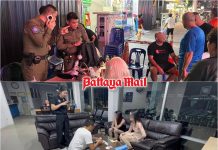
Thailand will work to boost educational quality in border and remote regions as well as target skills training to make the government’s Eastern Economic Corridor project a reality, Prime Minister Prayut Chan-o-cha said at a speech in Pattaya.
Speaking at the “Dimension of Education” seminar at the Ambassador City Hotel in Jomtien Beach Sept. 26, the premier said the government is pinning its hopes on education to bring “stability, wealth and sustainability” to the country.
Thailand, whose education system ranks last in Southeast Asia, is recognizing the importance of improving the quality of local education in all regions, Prayut said. So as part of its strategy it is creating a special educational-development zone in the Far South and in border areas.
It also will push development of schools in the highlands and on islands, areas that traditionally have not gotten as much support.
Finally, the PM said, the Education Ministry wants to integrate educational management in the EEC areas of Chonburi, Rayong and Chachoengsao, stressing vocational training to fill high-tech jobs the government wants to grow.
As part of its effort, the government will survey educational systems in other countries to see how they are being developed.
Deputy Education Minister Surachet Chaiwong said the seminar was organized to plan the integration of education management and development, especially in the South, where schools have suffered during the past 10-plus years of separatist strife.
The government also is worried about not having enough skilled laborers to make the EEC a success. The Eastern Economic Corridor project aims to move Thai manufacturing into higher-tech and higher-revenue sectors but currently the country’s schools are incapable of training people for those occupations.
Prayut said the government’s educational strategy is based on the “sufficiency economy” philosophy of HM the late King, By getting youths to think in those terms, he argued, they will develop a “thinker’s behavior” for life and will have the skills to stand on their own two feet.
Students must be taught to be reasonable, careful and focus on non-formal education, he added, which will help to reduce education inequality in society. Youths must learn important things in their communities and develop their neighborhoods.
Prayut said sustainable development in education is part of the UNESCO’s international campaign reflecting a vision for the world that everyone gains from learning the value of behavior and necessary ways of living for a sustainable future.





